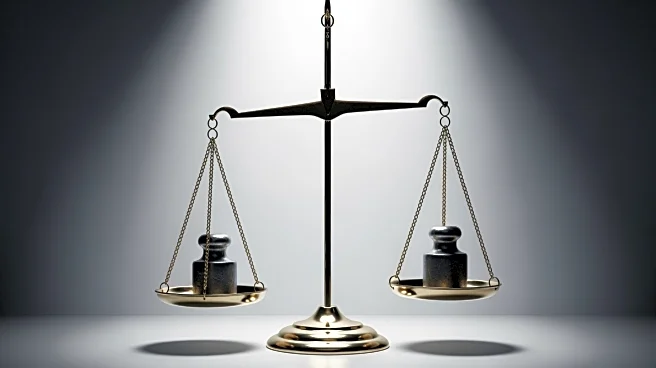What's Happening?
The U.S. Supreme Court is currently reviewing the legality of tariffs imposed by President Trump under the International Emergency Economic Powers Act. These tariffs, which have generated significant revenue,
are being challenged by several businesses and legal experts who question their legality. The court's decision could have far-reaching implications for economic activity, inflation, and federal policy. During the hearing, justices expressed skepticism about the legality of the tariffs, which have been a significant aspect of Trump's trade policy. The outcome of this case could lead to substantial refunds for businesses and consumers, potentially causing economic disruption.
Why It's Important?
The Supreme Court's decision on the tariffs could significantly impact U.S. economic policy and international trade relations. If the tariffs are struck down, it could lead to refunds totaling billions of dollars, affecting government revenue and potentially increasing the national deficit. This decision could also influence the Federal Reserve's policy on interest rates and inflation. Businesses that have paid these tariffs could benefit from refunds, while domestic manufacturers might face increased competition from imported goods. The ruling could redefine executive powers over trade issues, setting a precedent for future administrations.
What's Next?
The Supreme Court's ruling is expected to take several months, during which speculation will continue about the potential outcomes. If the tariffs are deemed illegal, the administration may need to issue refunds, which could be a complex and lengthy process. The decision could also prompt further legal challenges and adjustments in trade policy. Businesses and investors are closely monitoring the situation, as the ruling could affect market dynamics and economic growth. The administration has indicated that it may explore other legal avenues to maintain tariffs if the court rules against them.
Beyond the Headlines
The case highlights the tension between executive power and legislative authority in trade policy. It raises questions about the balance of power and the role of the judiciary in interpreting emergency economic powers. The decision could influence future legislative actions to clarify or limit executive authority in imposing tariffs. Additionally, the case underscores the economic impact of trade policies on various industries, including technology, construction, and manufacturing.









